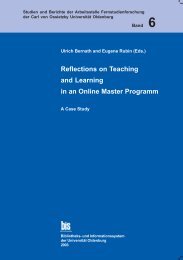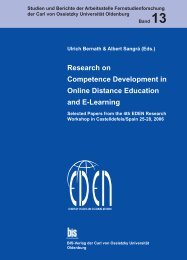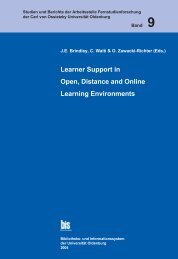Distance Education in Transition - Master of Distance Education ...
Distance Education in Transition - Master of Distance Education ...
Distance Education in Transition - Master of Distance Education ...
Create successful ePaper yourself
Turn your PDF publications into a flip-book with our unique Google optimized e-Paper software.
"Information" and "Knowledge" - On the Semantic Transformation <strong>of</strong> Two Central Terms<br />
and experiences which are subjectively and objectively correct, which has to be<br />
substantiated and justified <strong>in</strong> each case.<br />
On the other hand, however, it is also claimed that knowledge is a collection <strong>of</strong> facts<br />
and rules which exist objectively, and are therefore not dependent on or <strong>in</strong>fluenced by<br />
the subjectivity <strong>of</strong> def<strong>in</strong>ed <strong>in</strong>dividuals. This <strong>in</strong>cludes the concept that encoded<br />
<strong>in</strong>formation is stored <strong>in</strong> human neural systems: <strong>in</strong> other words, th<strong>in</strong>k<strong>in</strong>g is process<strong>in</strong>g<br />
<strong>in</strong>formation.<br />
Information Society or Knowledge Society?<br />
Jürgen Mittelstraß (1999, p. 728) summarised the problem that we are discuss<strong>in</strong>g here<br />
as follows: "We are stand<strong>in</strong>g on the threshold to a new society, but where will the road<br />
take us? Towards a pure <strong>in</strong>formation society? Or are we on the way to a knowledge<br />
society?". Now that we have elaborated on the differences between <strong>in</strong>formation and<br />
knowledge, it seems obvious to consider these questions with their help.<br />
Information Society<br />
It is clear that the spectacular advances <strong>in</strong> <strong>in</strong>formation and communication media cause<br />
the dom<strong>in</strong>ance <strong>of</strong> the term "<strong>in</strong>formation society". They now determ<strong>in</strong>e society's economic,<br />
cultural and social life and <strong>in</strong> addition possess a "potential or a new organisation <strong>of</strong><br />
material reproduction" (Wersig, 2000, p. 461). Their enormous power for alter<strong>in</strong>g structures<br />
has placed people under their spell and made "<strong>in</strong>formation society" <strong>in</strong>to an extraord<strong>in</strong>arily<br />
attractive slogan. Politics, <strong>in</strong>dustry and academics all discuss their chances and challenges7 .<br />
The resonance <strong>in</strong> the literature is enormous. For example, if the problem were to be<br />
decided us<strong>in</strong>g the number <strong>of</strong> academic titles on this subject <strong>in</strong> the university library at<br />
the FernUniversität <strong>in</strong> Germany, the equation <strong>of</strong> the priority <strong>of</strong> the two terms could<br />
easily be answered: there are 104 titles on the <strong>in</strong>formation society and just 9 on the<br />
knowledge society <strong>in</strong> 2002. The difference is even greater when we consider papers <strong>in</strong><br />
academic journals: <strong>in</strong> October 2002 the paper search eng<strong>in</strong>e JADE showed 375 titles on<br />
the "<strong>in</strong>formation society" and only 68 on the "knowledge society".<br />
There are also experts who place the emphasis from the start on <strong>in</strong>formation. Helmut F.<br />
Sp<strong>in</strong>ner (1994, p. 53 ff.) for example writes <strong>of</strong> a "knowledge order <strong>of</strong> the cognitive<br />
technological complex" <strong>in</strong> which "knowledge activities and stocks <strong>of</strong> knowledge" could<br />
be found. What he means here is the "creation, process<strong>in</strong>g, network<strong>in</strong>g, and dissem<strong>in</strong>ation<br />
<strong>of</strong> knowledge under the new technological conditions <strong>of</strong> electronic data process<strong>in</strong>g. N<strong>in</strong>a<br />
Degele (2000, p. 14) criticises this shift <strong>of</strong> the cognitive emphasis <strong>of</strong> society to a data<br />
pool because she fears that the abundance <strong>of</strong> <strong>in</strong>formation would then "be accompanied<br />
by a lack <strong>of</strong> knowledge." Joseph Weizenbaum (1998) identifies this situation by giv<strong>in</strong>g<br />
his lecture <strong>in</strong> the Tele-Akademie <strong>of</strong> the German “Südwest Fernsehen” the title "We are<br />
look<strong>in</strong>g for knowledge and are drown<strong>in</strong>g <strong>in</strong> <strong>in</strong>formation".<br />
7 For example the German Bundestag's Committee <strong>of</strong> Enquiry <strong>in</strong>to "The future <strong>of</strong> the media <strong>in</strong> <strong>in</strong>dustry and<br />
society - Germany's road to the <strong>in</strong>formation society", the "Council for Research, Technology and Innovation"<br />
with its recommendation "Information society. Chances, Innovations, Challenges" (1995). In addition, I would<br />
also like to refer to the book "Information Society - Media - Democracy" (1996) edited by Edelgard<br />
Buhlmahn et al. (All <strong>of</strong> these titles have been translated <strong>in</strong>to English).<br />
150





